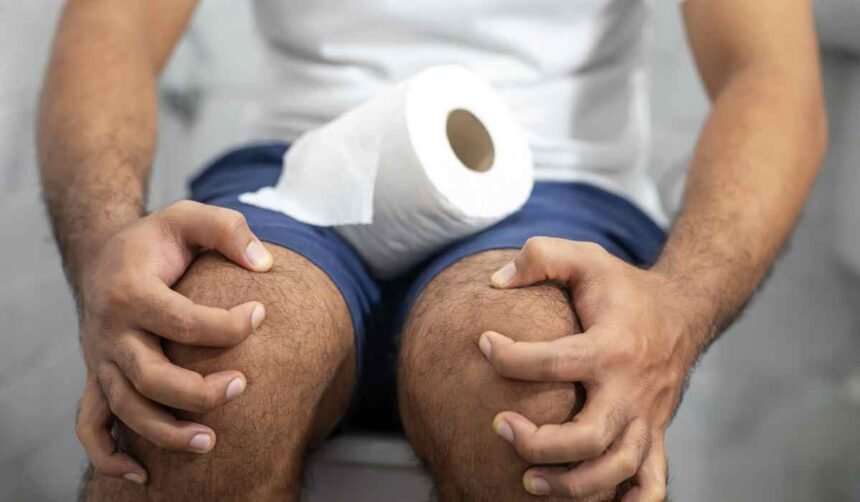Red poop can be alarming, but it usually isn’t a cause for concern. Red stool is most commonly caused by food, medication, or a medical condition that’s easily treatable.
Some of the most common causes of red poop include:
Foods
- Beets – Beets contain betalain pigments that can turn stool red. This is harmless. The red color should go away in 1-2 days once you stop eating beets.
- Tomatoes – Lycopene in tomatoes can also turn stool red. Like with beets, this effect should go away once you stop eating tomatoes.
- Red gelatin or drink mixes – Ingredients like Red 40 and Allura Red AC can lead to reddish poop. Avoiding these processed foods should take care of it.
- Paprika – The red pigments in this spice can temporarily color the stool.
- Cranberries – Contains anthocyanins that may contribute to red poop.
As you can see, many red foods can cause stool discoloration. This is not serious. The color change is only temporary.
Medications
- Antacids with iron – Iron supplements or antacids containing iron can often cause red poop. If this is the cause, the color change should dissipate once you stop the medication.
- Aspirin – An overdose of aspirin can injure the stomach lining and cause bleeding. This may make stool appear tarry and black, or bright red. Discontinue aspirin and call your doctor if you suspect bleeding.
- NSAIDs – Anti-inflammatories like ibuprofen can cause bleeding in the GI tract. This may appear as red stool. Stop the medication and talk to your doctor.
- Antibiotics – Some antibiotics kill off good gut bacteria, allowing “bad” bacteria to multiply. This can result in inflammation, ulceration, and bleeding in the colon – all of which can contribute to red stool. Probiotics can help restore good bacteria after antibiotics.
- Chemotherapy – Cancer medications damage fast-growing cells like those in the GI lining. This may manifest as red poop. Tell your oncologist about this side effect.
- Bismuth subsalicylate – This active ingredient in Pepto-Bismol can turn stool black or reddish. This is temporary and harmless. The color change should go away 48 hours after stopping the medicine.
Medical conditions
- Hemorrhoids – These swollen veins in the anus/rectum can bleed, especially when straining during a bowel movement. This may produce blood-tinged stool. Hemorrhoids usually aren’t serious, but talk to your doctor about treatment options.
- Anal fissures – Tears or ulcers in the anal tissue may bleed. This can cause pain, itching, and bright red blood on the stool’s surface. See your doctor to have fissures diagnosed and treated.
- Diverticulitis – Inflamed pouches (diverticula) in the colon wall can bleed. Symptoms include abdominal pain, fever, chills, cramping, and nausea. A doctor can determine if antibiotics, rest, and a liquid diet can resolve diverticulitis without complications.
- Ulcerative colitis – This chronic condition causes inflammation and ulcers in the colon. Rectal bleeding is a common symptom. Prescription medication and/or surgery may be necessary.
- Crohn’s disease – Another inflammatory bowel disease that can lead to bleeding, abdominal pain, diarrhea, weight loss, and other issues. Red stool could be a sign of a Crohn’s flare-up. See a gastroenterologist about disease management.
- Colon cancer – Rectal bleeding is a common symptom, though cancer isn’t always the cause. Get checked by a doctor to rule out other conditions. Early colon cancer treatment leads to better outcomes.
- Stomach cancer – Like with colon cancer, blood in the stool may be an early sign of cancer but can have other causes too. It’s important to get evaluated by a physician.
- Intussusception – This serious condition happens when the intestine telescopes in on itself, causing an obstruction. This most often occurs in children. Symptoms include vomiting, abdominal pain, and red currant jelly-like stool. It’s a medical emergency.
- Meckel’s diverticulum – An outpouching in the small intestine present from birth. It rarely causes problems unless it becomes inflamed and bleeds. This would lead to obvious blood in stool along with abdominal pain. Surgery can remove the diverticulum if necessary.
Other Causes
- Hematochezia – This term refers to visible bright red blood in or on the stool. It’s usually from bleeding in the lower colon or rectum. See your doctor to determine the cause.
- Melena – Black, tarry stool due to digested blood. This typically indicates upper GI tract bleeding. Melena is considered a medical emergency.
- Anal sex or improper rectal exam – This can cause rectal tearing and bleeding, especially if sufficient lubrication isn’t used. Avoid this activity until bleeding stops and anal tissues have time to heal.
In most cases, red stool results from foods or dietary supplements and is harmless. Medications, medical conditions, and rectal issues can also be at fault. Bright red blood on stool’s surface usually indicates lower GI bleeding. Black/tarry stool is a sign of upper GI bleeding.
See a Doctor Promptly If Your Red Poop
- Is persistent and not clearly linked to diet
- Occurs alongside other symptoms like diarrhea, abdominal pain, weight loss, etc.
- Appears black/tarry, which could signal dangerous upper GI bleeding
Don’t panic about an isolated bowel movement with a little blood from a torn hemorrhoid or anal fissure. But do make a doctor’s appointment to identify the cause of recurrent rectal bleeding. Early treatment leads to better outcomes for many colon conditions.
To Prevent Problematic Red Stool
- Increase fiber to relieve constipation and straining during bowel movements
- Stay hydrated to keep stool soft
- Follow up with your doctor as recommended if you have hemorrhoids or anal fissures
- Don’t use NSAIDs like ibuprofen frequently unless directed by your physician
- Take antibiotics and aspirin only as prescribed
- Get medical care if you experience chronic diarrhea, constipation, abdominal discomfort, etc.
- Maintain strong immune function through diet, exercise, sleep, and stress reduction
- Follow screening guidelines for colon cancer, starting at age 45
- See your doctor about managing chronic digestive conditions like IBD, diverticulitis, etc.
- Stop smoking and limit alcohol to support intestinal and colon health
- Include probiotics and prebiotics in your diet to nurture healthy gut flora
Red stool is often harmless but could indicate a more serious issue like colon cancer. Pay attention to your symptoms and talk to your doctor if red poop persists. Getting the right diagnosis and care is key to treating any underlying intestinal problem.
Here are some references with URLs for the article on causes of red poop:
References:
- Beets and Tomatoes Can Turn Poop Red:
https://www.medicalnewstoday.com/articles/324619 - Food Dyes and Red Poop:
https://www.medicalnewstoday.com/articles/324847 - Aspirin Overdose and GI Bleeding:
https://www.ncbi.nlm.nih.gov/books/NBK448190/ - NSAIDs and GI Bleeding:
https://www.ncbi.nlm.nih.gov/pmc/articles/PMC6151363/ - Antibiotics Disrupt Gut Flora:
https://www.ncbi.nlm.nih.gov/pmc/articles/PMC5404000/ - Chemotherapy Side Effects:
https://www.cancer.gov/about-cancer/treatment/side-effects - Hemorrhoids and Rectal Bleeding:
https://www.mayoclinic.org/diseases-conditions/hemorrhoids/symptoms-causes/syc-20360268 - Ulcerative Colitis Info:
https://www.medicalnewstoday.com/articles/324069 - Crohn’s Disease:
https://www.mayoclinic.org/diseases-conditions/crohns-disease/symptoms-causes/syc-20353304 - Colon Cancer Symptoms:
https://www.cancer.org/cancer/colon-rectal-cancer/detection-diagnosis-staging/signs-and-symptoms.html - Intussusception:
https://www.childrenshospital.org/conditions-and-treatments/conditions/i/intussusception




